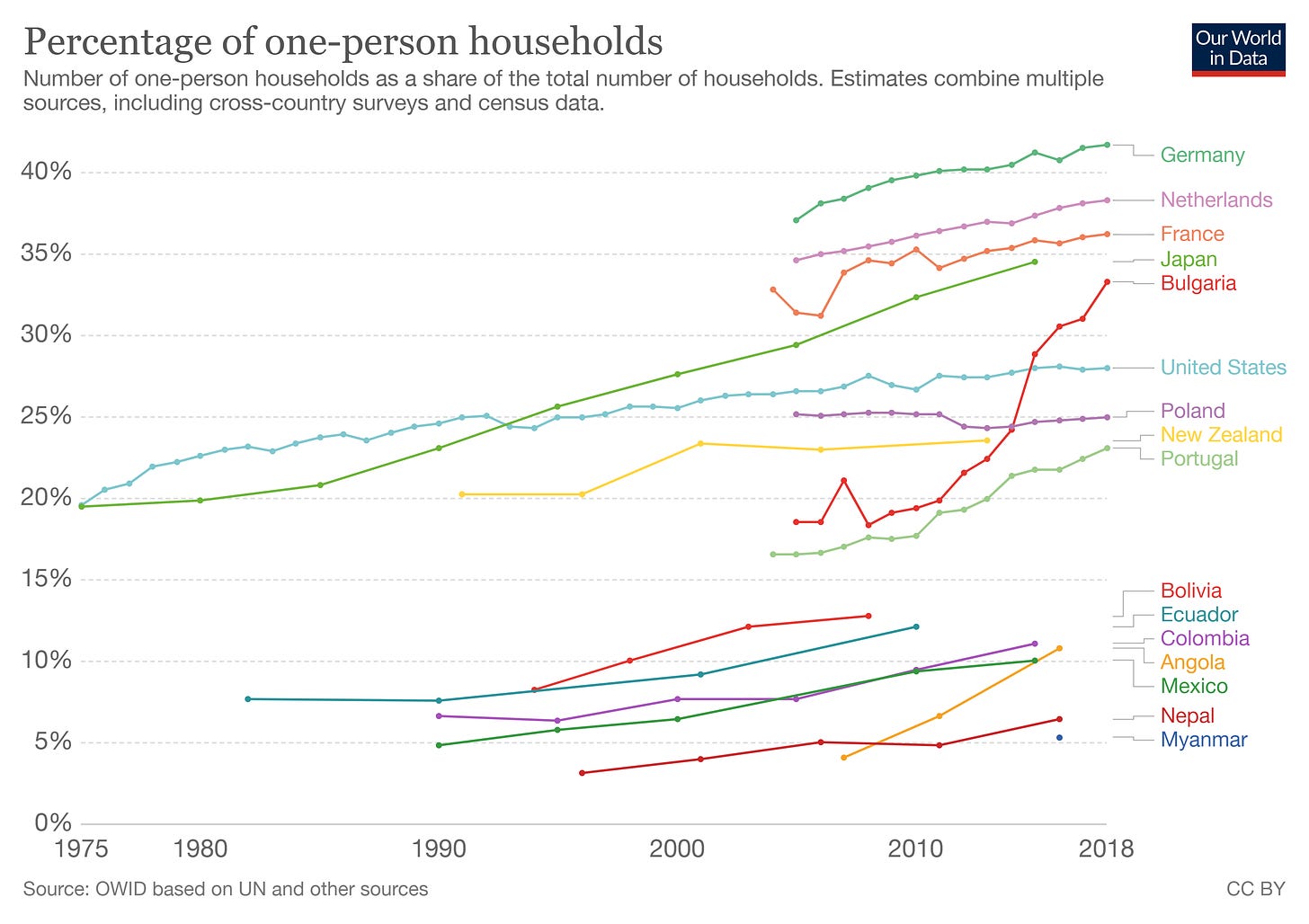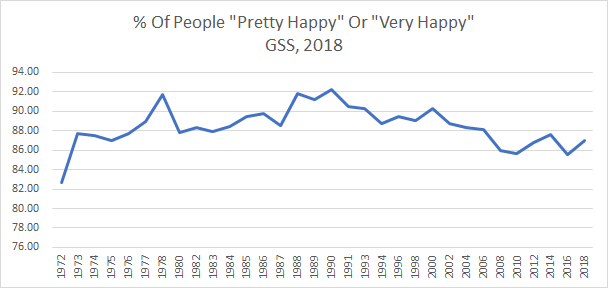#83: Self-Employment Principles, Family & The Middle-Income Trap
😎 Contemplation on life, work and what matters
February 22nd: Greetings from Taiwan. We’ve moved out of Taipei and are spending the past couple of days with Angie’s family before heading to Tenerife. We are skipping Vietnam to get out of Asia a bit earlier due to the unknowns around the virus.
For this weeks picture I offer you a mural from the Church that opened a fried chicken place under our apartment in Taipei. Loving the energy of this.

👋 Greetings to Julie, Kimya, Hamsini, Thomas, Adedayo, Charo, Naazima, Jennifer, Johnny, Julie, Reagan, Anton, Linda, William, Steven, Gregory, Pawel, Victor, Carlo, Maria, Sam, Jakes, Tassia, Valerie, Maria, John & Thaiza
🔥 If you'd like to become a supporter, you can do so here or join the 21 other patrons on Patreon
📩 Share this newsletter via e-mail or twitter#1 Operating principles 🚶♂️🎯
My self-employment journey started three years ago when I decided to take the leap.
I had no idea what I was getting into but I had a story I was telling people. Having this story helped me ignore that I had no idea what I was doing.
I’ve given up having a story as I’ve become more familiar with the ebbs and flows of solo work. However, I do have a number of working mental models which help me make decisions or decide what to work on. There are constantly evolving, but this is a first attempt at trying to articulate them.
💵 Push out the urge to cash in as far as possible
One of the hardest ones. Creating things often takes much longer than you imagine and the creative process itself often sends you in unexpected directions. By delaying the urge to be profitable right away, I find that starting smaller and giving myself permission to quit give me enough time to see if I actually like the work and help me build relationships without the pressure to scale. If you optimize for money too early, you might end up creating a job for yourself that you didn’t want. It seems that the whole game of self-employment is slowly adding small bits of work that you want to do without creating just another job.
😨 If I am taking work because I’m worried about money, I’m probably not seeing it clearly
Scarcity mindset has blinded me to the potential downsides of projects because I was too worried about making that feeling of insecurity go away rather than focusing on finding work I want to do.
I now ask myself these two questions before taking any new work
Rate it 1-10 without picking 7. If it is an 8+, do the project
How much would I pay to be able to work on this project?
👋 Make friends with people on a similar journey
In 2018, I attended the World Domination Summit, which is a conference for people living unconventional lives. I made a number of friends that I still talk with on a frequent basis. Having someone that can say “you’re not crazy, that’s how I feel too” is amazing when you are in a moment of doubt.
I’ve increasingly been able to find many others through Twitter which have turned into IRL meetings as well as other unexpected connections:

🧪 Do experiments that help me learn a new tool, skill or way of engaging with people
I try to do 3-4 new experiments each year that push me out of my comfort zone. The goal of these is to create a gap where I’ll have to teach myself something.

With the Reinvent course last year, it was leveling up video editing and synthesizing a lot of the things I’ve been writing over the last year. It also taught me that I wanted to put more energy towards online courses and bringing people together in 2020.
🧘♀️ Develop a capacity and skill for non-work
Its easy to plunge myself into work. I enjoy most of the things I work on, yet when I create space in my life for non-work and contemplation, that I when I feel the most alive.
There are always more tools to learn, things to write about or people to connect with but at a certain point it starts to undermine the whole point of trying to designing a life not oriented around work.
Many people claim they wouldn’t know what to do with their time if they weren’t working. I think that's because it takes some practice. However, it doesn’t take long to rekindle that same energy of yourself as a child when you would never imagine such a worry.
🤡 Find ways to do new kinds of work
My first official gig was doing a job for a financial firms via a talent platform. My job was to walk around New York City and try to find people wearing Allbirds to complete a five question survey. Going from working with Boards and CEOs one week to standing in Union Square Park holding a sign that said “Have Allbirds?” the next week was humbling but was also a symbolic way of realizing that if I really had to make money, there are always way to do it.
I’ve since gotten paid for writing, consulting, teaching assistant, coaching, youtube ads, patreon supporters, digital products, courses and speaking. I’ve realized that increasing the confidence of being able to make money in different ways is much more powerful than the perceived confidence of having more cash in savings.
🙄 Don’t convince myself I know what I’m doing
Self-employment is humbling. It makes you stressed and uncertain in a way that full-time employment never did. Over time I’ve realized this is feature, not a bug, enabling me to get a clearer view on how I might be deluding myself. Its easy to mistake a short-term financial win as proof that I know what I’m doing, but its usually not true.
Self-employment really isn’t anything special. It’s how most people have been hacking a living for thousands of years. Figure it out as you go…
#2 Freedom & Family 👨👩👦👦
The "default path” - school, job, house, family, success, retirement - is a useful script for many people, especially when young. It provides a general direction for life without having to know what you are doing.
In today’s world it is easier than ever to make changes in your life to tweak that default script or write your own.
Living and working nomadically wasn’t an accessible option even twenty years ago. Today with a stack of e-mail, Airbnb, Stripe and Microsoft office, you can hack a living and travel the world.
We see this expression of freedom in all aspects of people’s lives. One of the most interesting trends as countries get richer is that people tend to decide to live with less people. This chart looks at the rise of one-person households over time.

Andrew Taggart wrote of the emergence of a “secular monk” especially among men in today’s world:
The “new celibacy” is one of the habits of success. Family life is constant disruption. You can’t sleep soundly when your child wails all night with a cough and fever. You can’t perfect yourself when you must always consider your wife’s needs. Secular monkhood requires a strict regimen. It’s good for a man to be alone.
No matter the reasons or explanations, less people are designing their lives around a nuclear family, let alone an extended family or communities in general.
A recent article from David Brooks reflected on the implications of this shift. This quote gets to the point, but doesn’t do the full article justice.
If you want to summarize the changes in family structure over the past century, the truest thing to say is this: We’ve made life freer for individuals and more unstable for families. We’ve made life better for adults but worse for children. We’ve moved from big, interconnected, and extended families, which helped protect the most vulnerable people in society from the shocks of life, to smaller, detached nuclear families (a married couple and their children), which give the most privileged people in society room to maximize their talents and expand their options. The shift from bigger and interconnected extended families to smaller and detached nuclear families ultimately led to a familial system that liberates the rich and ravages the working-class and the poor.
I grew up surrounded by a large loving extended family and reaped the hard-to-quantify benefits that Brooks hints at in the essay. I likely wouldn’t be able to navigate this current journey without the support I’ve received from so many people throughout my life.
Yet it is hard to reconcile the fact that I don’t seem to be orienting my life towards repeating that pattern. Marrying someone who grew up 7500+ miles away certainly doesn’t lend itself to living near all my relatives. This is a tension I’ll likely never fully resolve.
This is a tension that many people who are ready to start families are dealing with too. I’m 35 and many of my friends are having the “should we stay in the city or move further away to get a house like the one we grew up in?” as we speak.
David Autor’s research on the labor economy highlights this issue:
“the densest urban counties have become so appealing to prime-age workers that they’re now less likely to move away at life stages when previous generations have retreated to the suburbs, like when children arrive.”
While the majority of people consistently report that they are at least “pretty happy”, there does seem to be somewhat of a downward trend in overall life satisfaction. Whether this is tied together or not, I cannot be totally sure.

I don’t agree with all of the article or the title saying that the nuclear family was a “mistake” - however, I think Brooks offers some interesting extension of the idea of family from his own experience joining a local group.
I joined the community and never left—they became my chosen family. We have dinner together on Thursday nights, celebrate holidays together, and vacation together. The kids call Kathy and David Mom and Dad. In the early days, the adults in our clan served as parental figures for the young people—replacing their broken cellphones, supporting them when depression struck, raising money for their college tuition. When a young woman in our group needed a new kidney, David gave her one of his.
As the default path becomes many paths, shaped by both the labor economy and more options, we will need a re-invention of what communities of the future look like.
#3 The Middle Income Career Trap 🚫
I liked this idea from Byrne Hobart. One of the challenges of succeeding in the corporate world is that the if you keep progressing you become a prime target for layoffs because of your large salary.
Except that at some point, there’s a record-scratch moment where the job switches from mostly doing the work to mostly getting clients and running projects. These are very different skills! Unless a company has a very top-heavy organizational structure, or it’s growing exceptionally fast, there aren’t enough senior jobs for every new hire to get promoted to a senior role. Some people get promoted until they’re stuck. Not senior management material, but not worth firing — until the company needs to lay people off, at which point mid-career employees are the easiest targets because they’ve accumulated nice base salaries but don’t have big bonuses that could be reduced.
👉 Check out the whole article here.
#4 Joseph Campbell on Growing Up
We are in childhood in a condition of dependency under someone’s protection and supervision for some fourteen to twenty-one years—and if you’re going on for your Ph. D., this may continue to perhaps thirty-five. You are in no way a self-responsible, free agent, but an obedient dependent, expecting and receiving punishments and rewards. To evolve out of this position of psychological immaturity to the courage of self-responsibility and assurance requires a death and a resurrection.
The Power of Myth
#5 Who do you want to be?
Most people don’t factor this in enough in their career deliberations

That’s all for this week. Have a good weekend!

Want to Support Boundless? All of the options here
👉 If you want to learn more about who I am or what I’m working on, find me here, say hi on twitter, or check out some of my longform writing. If you aren’t subscribed to the e-mail, join us here:




